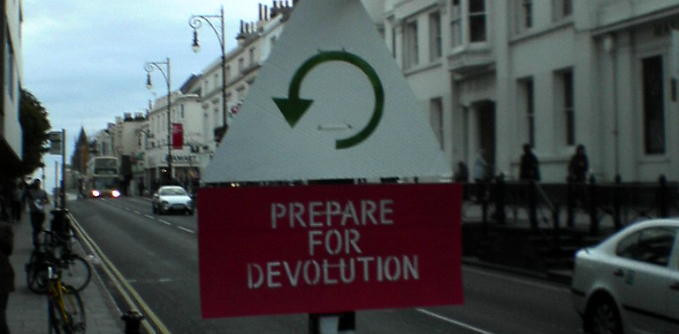 Most researchers still treat Europe’s crises as anomalies on the path to integration. That needs to change, says Henrik Scheller, who argues that the challenges facing the EU call for a different approach – one that scholars should not be afraid to tackle.
Most researchers still treat Europe’s crises as anomalies on the path to integration. That needs to change, says Henrik Scheller, who argues that the challenges facing the EU call for a different approach – one that scholars should not be afraid to tackle.
When the economic and financial crisis hit Europe in 2008 it was not just politicians who found themselves scrambling for answers. Researchers, particularly in political science and law, have also struggled to explain the scale and impact of what is clearly the worst crisis the EU has ever experienced.
Researchers’ befuddlement is hardly surprising. For more than 50 years their work has underpinned the integrationist vision of European institutions. Academics have gained entry to the European elites, with finance from EU research grants and political consulting contracts from EU and national ministries. The collective political and academic view of European integration is of a one-way street of continual, irreversible progress.
This intellectual perspective on European integration has suited political tastes. Only a few scholars have tried to look at things from the other direction and consider the political, economic and social causes and consequences of European disintegration. Even today many researchers, while acknowledging Europe’s troubles, shy away from the term disintegration and deny that it requires an integrated intellectual approach.
It has proved difficult to break out of the rigid narratives of integration and to cross disciplinary boundaries in search of explanations. Most political scientists see the crisis as an isolable economic peculiarity. These scholars cling to traditional theories and largely ignore recent developments in European sociology and political economics. Only gradually has a small group of researchers started to consider questions of European disintegration.
Fear of a Pandora’s box
The trajectory of research until now is understandable. The attractiveness of the idea of a peaceful and prosperous EU is undeniable. Integration theories exist to explain processes of integration. It might be, therefore, that both politicians and academics fear that seriously studying disintegration would open Pandora’s box.
But failing to contemplate such an outcome, however undesirable, means ignoring important research questions and relinquishing political self-determination. The past seven years have revealed the limitations of a piecemeal, one-dimensional approach to European integration. The Greek crisis and the refugee disasters on the Mediterranean Sea show us that economic, political and social disintegration are clearly linked.

An interdisciplinary project to understand the European crisis and its intensifying social consequences is vital. What are the effects of specific market developments on social inequalities in member states? How do these disparities in turn influence member states’ political positioning in Europe and their actions at EU level? How do regional secession efforts affect the EU’s capacity to act as a whole? Such multi-dimensional questions have received little attention.
Beyond Eurobarometer
A better understanding of these issues will require independent and reliable long-term surveys of the attitudes to the social, economic and cultural impact of integration in all member states. The Eurobarometer surveys conducted on behalf of the European Commission failed in this task; several analyses show their questions are biased in favour of the EU and its institutions. Also necessary are a greater number of broad, qualitative studies on the reception of the European unification project. Their aim should be to identify and better understand the social and cultural drivers of European disintegration that may lurk deep in member states’ psyches.
European disintegration could be defined as the series of processes that erode legal, economic, territorial and socio-cultural integration to take us back to conditions before unification, driven by individual or collective actors both within and outside the European system. We need more research to understand how these processes relate to each other.
Disintegration should not be viewed as a one-way street. Disintegration per se should not be equated with crisis and decay. The present EU crisis shows quite clearly that disintegrative trends always stem from integrative impulses and vice versa. Integration and disintegration are two halves of a dialectical process with systemic, social, overt and covert dimensions. Stable, adaptive institutions remain so by constantly dismantling and changing their structure.
A new measure of academic openness, curiosity and tolerance is imperative. Research into European disintegration need not be stigmatised; neither should it be seen as a rejection of existing integration theories or of an integrated EU. Instead it can serve a complementary function.
Disintegration is the flipside of integration. Without an overarching theory to understand it, we cannot devise policy tools to address it.
Henrik Scheller is an interim professor in German and European politics and government at the University of Potsdam. His paper, European Disintegration – non-existing Phenomenon or a Blind Spot of European Integration Research? (Institute for European Integration Research) is published by the University of Vienna and co-authored with Annegret Eppler.
This article first appeared in Research Europe. It represents the views of the author and not those of the BrexitVote blog, nor the LSE.







Failure-analysis, they call this in hitech… falsifiability, in other disciplines… The flipside of all the rosy prognosis indulgence which has surrounded EU analysis too often — yes it is good, always, to think the unthinkable, consider whether the frozen 0-ring really _would_ shatter, wonder whether the theoretical physics really _might_ be used to build a bomb, the European 1930’s were littered by too many refusals to do precisely that.
In all fairness to EU proponents, however, such analysis is political. Serious consideration of the flipside, of EU disintegration rather than integration, can become or at least get mis-used as self-fulfilling prophecy. It is important to remember, too, that modern info-tainment media grabs only the headline, Digital Era attention-spans are short, too often these days the results of meticulous research get presented in a 140-character tweet. No wants her/his well-balanced objective study presented as, “Research group predicts demise of the EU!” — but this will happen…
That said, there are careful readers out here as well. We would enjoy, even greatly benefit, from some scenario-development on European disintegration: a scale of outcomes, not necessarily descending but just different, which we could consider in making policy & political decisions. Of course the Bad News therein would become Headlines, but those of us sans tv & who don’t read Rupert Murdoch — we stubborn few — would benefit. The trick would be presenting the result so it, a) would not be Sensationalized, and, b) still would get read — that’s one delicate balance very hard to achieve, these days.
All the discussion on Brexit (or Bremain) that I have seen discusses the impact on politicians’ and businesses’ interests, but little on British society.
For example, “British global influence” does not affect crime rate, “loss of access to the European market” has little to do with the Health Service, and the prediction of London’s financial meltdown does nothing to attract interest from Shires and Rural Britain worrying about floods and infrastructure deficiencies.
My point is, simply, that the UK ‘people’ are not fully engaged with the discussion.
Yes, there may be jobs lost or gained by leaving Europe and there may be investment lost or gained, but nobody outside of the elite knows, or cares to worry about things out of their control.
What seems a real plus for me, is that, in becoming less attractive to finance and business (and, as a result, the corrupt and self-congratulatory practices that go with them), British society stands to gain in the re-balancing of societal pressures (housing, crime, health, education).
It may do Britain good to get out the endless rat-race and creation of celebrity fat-cats that Capitalism has become.